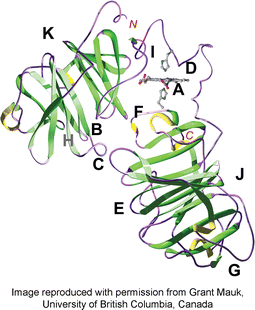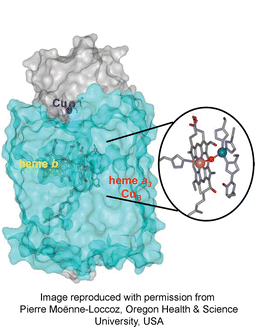Editorial: The chemistry and biochemistry of heme proteins
Emma Raven was born in Northamptonshire, UK, and obtained her BSc in Chemistry from the University of Leicester. Her interest in metalloproteins goes back to her PhD work at the University of Newcastle Upon Tyne, where she studied with Geoff Sykes. She then moved to the University of British Columbia (Vancouver) to work in Grant Mauk’s laboratory, where she learned about heme proteins, protein engineering and local breweries. In 1995, to her great surprise, she was offered a lectureship at the University of Leicester where she is currently Professor of Biological Chemistry.
Paul R. Ortiz de Montellano, whose full name is even longer, received his BS from MIT and his MS and PhD from Harvard University. His doctoral work with E. J. Corey and Konrad Bloch, strengthened by postdoctoral work with Duilio Arigoni at ETH in Zürich, provided the foundation in synthetic chemistry and biochemistry that supports his current interests in the mechanisms of hemoproteins and drug design. He is currently on the faculty of the University of California, San Francisco. Outside of chemistry, his interests lie in the direction of Austen, Puccini, Piero della Francesca, and Zinfandel.
Heme-containing proteins have attracted the attention of the scientific community since the beginning of modern enzymology. With their coloured prosthetic groups, varied oxidation states, and diverse biological functions, they have provided a rich and fertile terrain for the elucidation by chemists, biophysicists and biologists of protein structure–function relationships. Much of the earliest work on heme proteins centered on the readily available globins (hemoglobin, myoglobin), peroxidases, and electron transfer proteins (the cytochromes). However, as a result of improved enzymological techniques, recombinant protein expression, and the advent of the genomic age, the hemoprotein family tree has been shown to include many previously unsuspected and exciting branches. Furthermore, the increasing sophistication of the techniques of structural and molecular biology now make it possible to probe the detailed mechanisms of these enzymes to a level of detail that even the most imaginative of the early pioneers would surely have never conceived of.
Our objective in this issue is to provide the reader with a bird's eye view of the heme enzyme field, including (a) proteins that are currently of high interest, (b) new proteins that are likely to grow in importance in the coming years, and (c) biophysical techniques that are particularly useful for the study of hemoproteins. We hope that the result of this endeavour is a repository of information that will be useful not only for the specialist wishing to delve into the complexities of a specific area but also for those more casual readers just wanting to dip their toes in the water.
Emma Raven, University of Leicester
Paul Ortiz de Montellano, University of California, San Francisco
| This journal is © The Royal Society of Chemistry 2007 |




